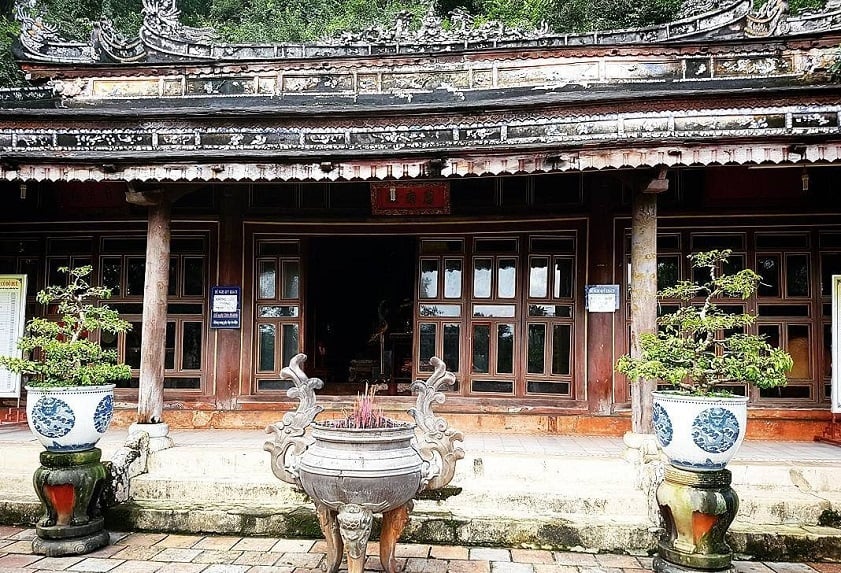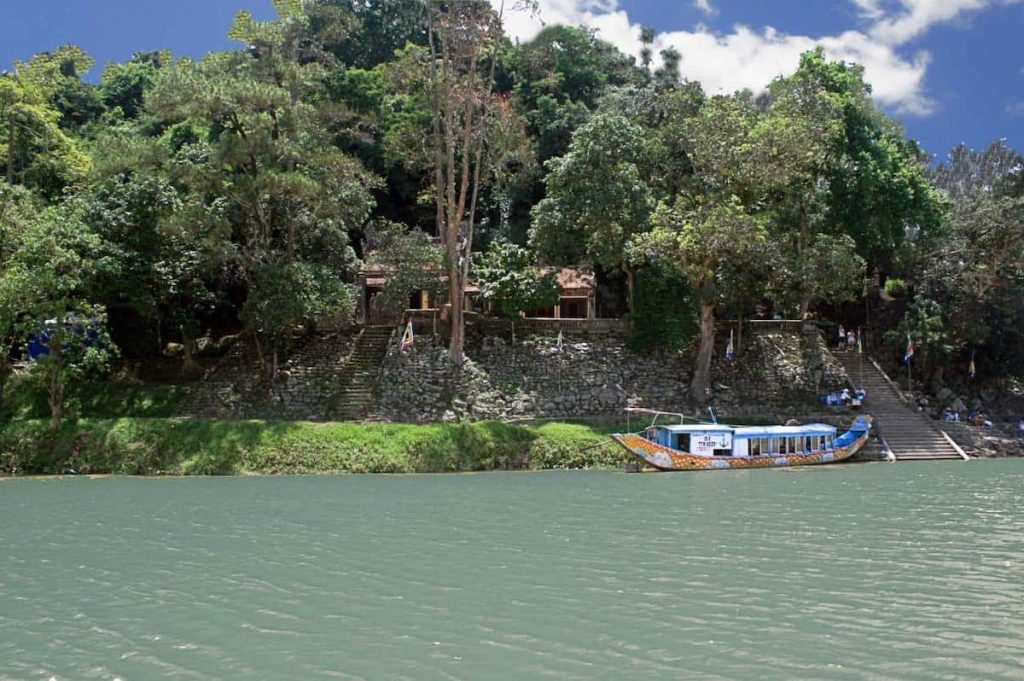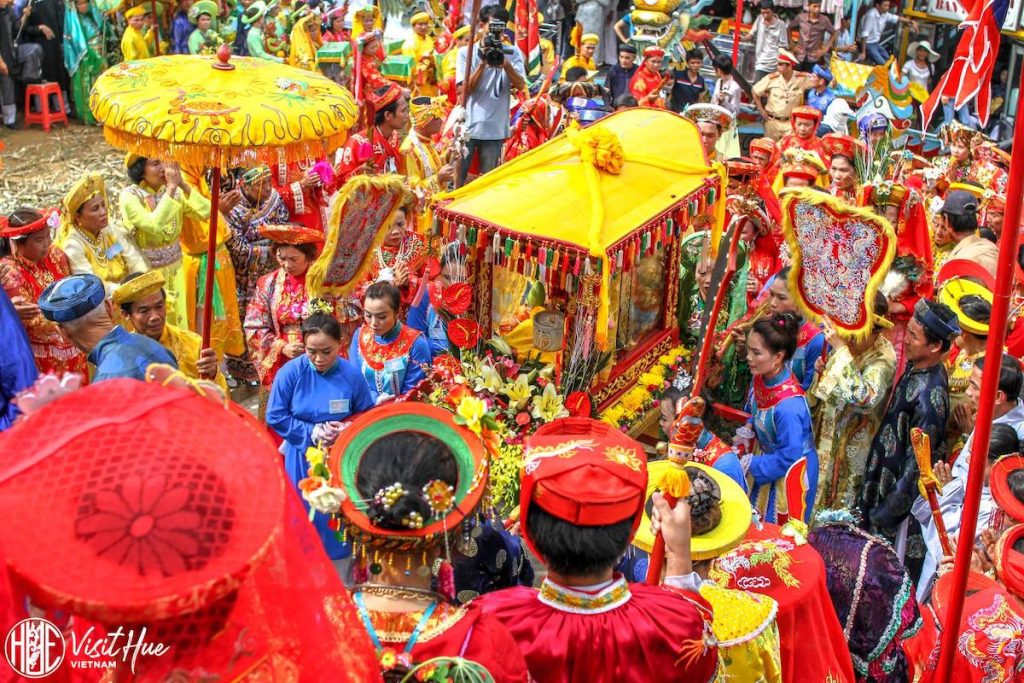Hon Chen Temple in Hue is known as an extremely sacred place of worship, a symbol of Hue’s culture. If you visit during the festival season, you will witness a multitude of vibrant colors and cultural aspects that only dreamy Hue possesses. So why wait? Let’s explore Hon Chen Temple with DanangPrivateCar.com’s right away! Let’s go!.
Table of Contents
Introduction to Hon Chen Temple in Hue
Where is Hon Chen Temple located?
Hon Chen Temple is situated on Ngoc Tran Mountain, within the territory of Ngoc Ho Village, Huong Tra Town, Thua Thien Hue Province. This temple holds significant importance in the spiritual life of the people of Hue and is also the only temple in Hue that harmoniously combines royal rituals with cultural and folk beliefs.

To explore Hue and its many attractions, the private tour service with a driver in Hue from DanangPrivateCar.com will help you with that. With door-to-door service and local drivers, you will be able to discover Hue in general, as well as Hon Chen Temple in particular, in the best possible way. Additionally, if you are in Da Nang or Hoi An and want to visit Hue in a day, you can book a day trip from Da Nang to Hue with us.
The legend associated with the name of Hon Chen Temple is quite remarkable. Explaining the name “Hon Chen” in Hue.
Both Hon Chen Temple or Hoan Chen Temple are closely linked to the most prominent legend here. Once, during a boat trip on the Perfume River, King Minh Mang accidentally dropped a precious jade cup. It seemed impossible to retrieve, but then a turtle emerged, holding the jade cup in its mouth, returning it to the king. Doesn’t it sound similar to the legend of Hoan Kiem Lake? Besides, at one point, the temple was also renamed Huệ Nam Điện (bringing blessings to the southern kingdom) during the reign of King Dong Khanh. Whatever the reason, the history section of the temple on DanangPrivateCar.com will explain it to you right away. However, due to the short reign, people were still not accustomed to this name. Therefore, later on, the temple on Ngoc Tran Mountain continued to be called Hon Chen Temple.
The history of Hon Chen Temple
Hon Chen Temple was initiated for construction during the reign of King Gia Long, primarily for Daoist worship. However, during the Nguyen Dynasty, the temple was mentioned in ancient texts with the official name “Ngoc Tran Son Tu”, meaning “temple at Ngoc Tran Mountain”. During the reign of King Dong Khanh, as he awaited succession from his father, King Tu Duc, who had not yet abdicated, he sought help from his mother to visit Ngoc Tran Temple to pray and consult the Holy Mother Thien Y Ana to see if he would become king. The Holy Mother assured him that his wish would be fulfilled. Therefore, immediately after ascending to the throne in 1886, to repay the favor to the Holy Mother, he had the temple renovated in a grand manner, casting numerous sacred objects for worship, and renaming the temple Hue Nam Dien.

Hon Chen Temple in Hue – Bustling festival seasons
When visiting Hon Chen Temple in Hue, you will not only see architectural structures with a strong historical imprint such as Minh Kinh Dai Temple, Ngoc Hoang Palace, altars of officials, Ngoai Canh Pagoda, and the cave shrine of Mr. Tiger. In addition, there are also Quan Cu Temple, Thanh Pagoda, Trinh Cat Institute, and Thuy Phu Palace right next to the Perfume River. What’s particularly noteworthy is that to this day, Hon Chen Temple still preserves over 600 ceremonial items belonging to 284 different categories, all of immense historical value.

If you happen to visit during a festival, you’ll witness a completely different Hon Chen Temple with vibrant colors such as dragon boats, traditional costumes ranging from ao dai to ceremonial attire. Festivals are not only about worshiping deities but also about local cultural and spiritual life. Festivals are divided into two main parts: the procession of deities (escorting the deities back to the temple) and the main ceremony.
Procession of Deities
The Procession of Deities is held to escort the goddess Thien Y Ana from Hon Chen Temple to Hai Cat Village. As a significant event, the Procession of Deities is conducted very solemnly on the Perfume River with many dragon boats adorned with intricate dragon and phoenix motifs. The surroundings are decorated with colorful flags. The festival atmosphere is lively with the sound of folk songs and traditional music performances.

Main Ceremony
The main ceremony takes place immediately after the Procession of Deities, once the deities and Holy Mother have been welcomed. The ritual involves various diverse activities, including offerings to the Holy Mother, releasing of creatures, releasing of lanterns, village ceremonies at Hai Cat… All visitors enthusiastically embrace this deeply local and spiritual culture, so every festival season draws large crowds to experience it.

What do visitors say about Hon Chen Temple in Hue?
“The scenery is beautiful. You can also have a panoramic view of the river from the port. However, the road leading to this place is quite narrow and dangerous. It’s better to go by motorcycle or boat for safety.” Phuc Nguyen – A Google Local Guide shared.
“Hon Chen Temple is very solemn, and the ticket collector said it’s very sacred. Stepping into the temple feels serene and indescribable. There are two ways to enter the temple: the road is quite rough, there are two paths leading to the temple gate, and the ticket gate is only at the direction of the pier. Usually, tourists take the boat, only locals take this route. If you go to Thien Mu Pagoda, just go straight on that road to reach the temple. About 5km and in the direction I went, on the left gate.” Excerpt from a very detailed comment by Balo Taka.
Notes when visiting Hon Chen Temple:
- The road is quite narrow, so it can be dangerous, therefore, it’s safer to choose to go by boat! Taking a boat on the Perfume River will also give you more interesting experiences!
- Inside the temple area, photography is not allowed, so please be mindful of that!
- As it is a sacred area, please dress modestly, avoid excessive exposure to preserve the peaceful atmosphere inside the temple.
- Avoid loud and disruptive behavior within the temple area.
- Maintain general cleanliness to preserve the scenic beauty for those who come after you.
- Even during festival seasons, you will see many local people throwing a lot of fake gold and silver paper into the Perfume River to pray for good luck, so please refrain from doing so! Because this will affect the ecological system of the river as well as environmental pollution.
DanangPrivateCar.com’s has introduced to you about a famous and sacred temple in Hue. Many travelers brave long distances to visit Hon Chen Temple to pray for blessings or express their wishes to the deities there! Therefore, if you are a spiritual devotee, your itinerary to explore Hue should definitely not overlook Hon Chen Temple!


Comments